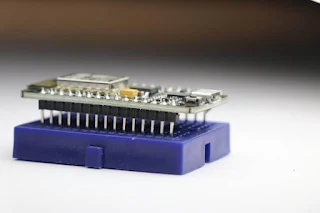When it comes to the best type of WiFi Modules, ESP series has been taking the lead, ESP-01 is one the ESP series; it comes with a self-contained SOC, integrated TCP/IP protocol stack that allows for any microcontroller to access your WiFi network.
These are the best WiFi Modules, namely the ESP8266, ESP32 and nodeMCU. All of them work pretty well with Arduino boards.
ESP8266
ESP8266 is known has the most used WiFi module in the tech community. it Offers a complete and self-contained WiFi networking capabilities, it enables it's users to host the application functions from another application processor.
It also has an on-board processing and storage capabilities that allows easy integration of sensors and other application-specific devices through GPIOs.
Properties of ESP8266:
802.11 b / g / n
Wi-Fi Direct (P2P), soft-AP
Built-in TCP / IP protocol stack
Built-in TR switch, balun, LNA, power amplifier and matching network
Built-in PLL, voltage regulator, and power management components
802.11b mode + 19.5dBm output power
Built-in temperature sensor
Support antenna diversity
off leakage current is less than 10uA
Built-in low-power 32-bit CPU: can double as an application processor
SDIO 2.0, SPI, UART
STBC, 1×1 MIMO, 2×1 MIMO
A-MPDU, A-MSDU aggregation and the 0.4 Within the wake
2ms, connect and transfer data packets
standby power consumption of less than 1.0mW (DTIM3)
Uses:
Smart Power socket
Home Automation
Smart home system
Smart Camera
wireless control
Network Camera
Sensor networks
Wearable electronics
Wireless location-aware devices
Security ID tag
Wireless positioning system signals
Advantages:
Low Power Consumption with high-end patented power management technology
A plethora of information/guide available due to its popularity
The module is cheap
It is compatible with Arduino IDE programming environment
Disadvantage:
It is comes with limited pins.
ESP 32
ESP32 is a single 2.4 GHz WiFi and Bluetooth module that integrates the TSMC ultra-low power technology. it's widely use because of it's performance, versatility, and reliability in a wide array of applications.
ESP 32 properties:
working voltage: 5V
Current: 80mA
Battery: 3.7V
802.11 b/g/n/e/i
802.11 n (2.4 GHz), up to 150 Mbps
802.11 e: QoS for wireless multimedia technology
WMM-PS, UAPSD
A-MPDU and A-MSDU aggregation
Block ACK
Fragmentation and Defragmentation
Automatic Beacon monitoring/scanning
802.11 security features: pre-authentication and TSN
WiFi Protected Access (WPA)
/WPA2/WPA2-Enterprise/Wi-Fi Protected Setup (WPS)
Infrastructure BSS Station mode/Soft AP mode
WiFi Direct (P2P), P2P Discovery, P2P Group Owner mode and P2P Power Management
UMA compliant and certified
Antenna diversity and selection
Uses:
Low-power IoT Sensor Hub
Low-power IoT Data Loggers
IoT projects
Smart Building systems
sensor monitoring
consumer Electronics
Advantages:
It is a Low-power board
it is a dual board
Bluetooth v4.2 BR/EDR compliant
Disadvantage:
this WiFi module board is more suited for developers because of it's complexity.
NodeMcu:
The NodeMCU (Node MicroController Unit) is a free to use stand-alone wifi module board, it comes with an inexpensive System-on-a-Chip (SoC) called the ESP8266. It contains all necessary elements of maximum performance. CPU, RAM, networking (wifi), and even a modern operating system and SDK. Node MCU is less expensive. That makes it the best choice for all kinds of IoT projects.
NodeMcu properties:
Microcontroller: Tensilica 32-bit RISC CPU Xtensa LX106
Operating Voltage: 3.3V
Input Voltage: 7-12V
Digital I/O Pins (DIO): 16
Analog Input Pins (ADC): 1
UARTs: 1
SPIs: 1
I2Cs: 1
Flash Memory: 4 MB
SRAM: 64 KB
Clock Speed: 80 MHz
USB-TTL based on CP2102
Antenna diversity and selection
Uses:
Mini IoT projects
Sensors monitoring
Smart home system
IoT projects
wearable electronics
consumer electronics
Advantages:
Master and slave communication.
The NodeMcu board is less expensive and very light.
Disadvantage:
It comes with less analog pin.
In conclusion,if you are working on bigger IoT/ embedded systems projects consider using ESP32 wifi module board, NodeMcu wifi module board works perfectly on medium IoT/embedded systems projects, ESP8266 wifi module board works very well on small IoT/embedded systems.
Related Topics
Top 4 reasons why you must learn how to use Arduino.
(9) Nine common mistakes you must avoid while working on Arduino board.
Top 10 sensors (modules)widely use in arduino projects and other microcontrollers.






0 Comments